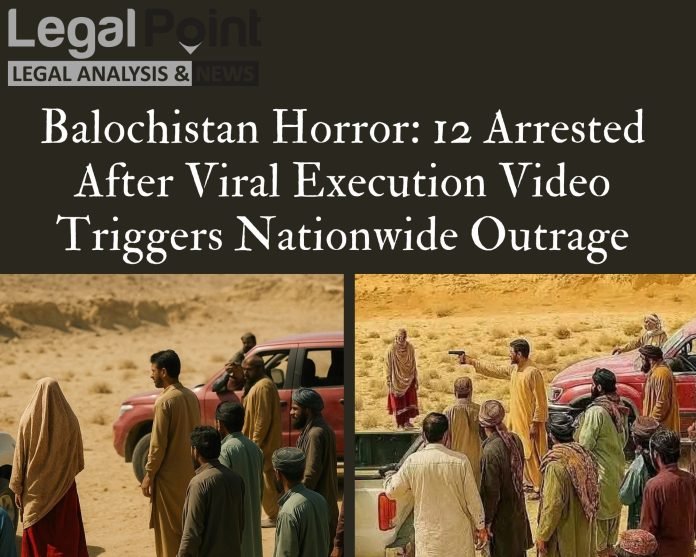Balochistan Horror: 12 Arrested After Viral Execution Video Triggers Nationwide Outrage
Following the release of a startling viral video that showed the double murder, Pakistani police have detained 12 people in relation to the cold-blooded death of a man and woman in the isolated desert province of Balochistan. The incident, which has drawn sharp national and international criticism, highlights the ongoing menace of “honor killings” and the struggle between tribal customs and state justice in Pakistan.
Balochistan Horror: 12 Arrested After Viral Execution Video Triggers Nationwide Outrage
Gruesome Murder Captured on Video
The viral video, shared widely across social media platforms, shows over a dozen men standing in a barren mountainous area, with SUVs and pickup trucks parked in the background. A woman is seen being ordered to stand with her back to the group before a man steps forward and shoots her in the back at point-blank range. Moments later, the same man turns his gun toward a middle-aged man and executes him in a similar fashion.
The video sparked nationwide outrage, with human rights groups, citizens, and public figures condemning the act and demanding immediate justice.
Official Response and Arrest
Balochistan’s Chief Minister Sarfraz Bugti confirmed the arrests in a press conference on Monday.
“I took immediate notice of this heinous act and directed the Inspector-General of Police to arrest all those involved within 24 hours,” he said.
Initially, one suspect was arrested, followed by 11 more, including a tribal leader suspected of having orchestrated or authorized the killings.
Bugti stated that further raids are being conducted to capture others who were present or complicit.
Victims Were Not a Couple, Officials Clarify
Contrary to earlier media reports claiming the victims had married by choice, Bugti clarified:
“The woman who was killed had five children and was married to a man named Noor. The man who was killed was approximately 45–50 years old and had four to five children as well. They were not married to each other.”
While the nature of their relationship remains unclear, the CM emphasized that the killing had no legal or moral justification, regardless of social or tribal norms.
Negligent Police Official Suspended
The Deputy Superintendent of Police (DSP) of the area where the crime took place has been suspended for failing to inform the government or take timely action.
“This level of negligence is unacceptable,” Bugti said, adding that disciplinary action would follow against any officer found complicit through inaction.
No Family Member Has Filed Complaint
In a disturbing revelation, no relative of the murdered man or woman has stepped forward to file a First Information Report (FIR) or register a legal complaint.
“No one has come forward as a complainant. Not a single person is willing to lodge an FIR,” Bugti stated. This reflects the culture of fear, silence, and tribal pressure that continues to obstruct justice in such cases.
Honor Killings: A Persistent Scourge
Balochistan government spokesperson Shahid Rind confirmed that the incident occurred during the Eid Al-Adha holidays. He labeled the act as another dark chapter in the long-standing crisis of honor-based violence.
In many rural and tribal parts of Pakistan, “honor killings” are still practiced, often with the tacit or overt approval of tribal councils (jirgas) that settle disputes outside the constitutional framework.
Despite progressive legislation passed in recent years, enforcement remains weak, and cultural barriers persist.
Frequently Asked Questions (FAQs)
Q1: What is an honor killing?
Honor killing refers to the murder of a person (typically a woman) by family or community members due to the belief that they have brought “shame” upon the family.
Q2: Are honor killings legal in Pakistan?
No. Honor killings are criminal acts and are punishable by death or life imprisonment under Pakistan’s Penal Code.
Q3: Can tribal councils (jirgas) issue such orders legally?
No. Jirgas have no legal authority to sentence individuals. Their decisions, especially those involving corporal punishment or death, are unlawful and unconstitutional.
Q4: What should someone do if they fear for their life in such cases?
They should immediately contact a lawyer, human rights organization, or law enforcement. Legal Point and other advocacy groups offer protective legal options and safe shelter referrals.
Q5: Why do families not file complaints in such cases?
Social pressure, fear of retaliation, and loyalty to tribal codes often prevent families from seeking justice. In many cases, the state must act suo motu (on its own) when families remain silent.
Legal Point: Your Partner in Justice
If you or someone you know is affected by similar threats, unlawful tribal decisions, or honor-based violence, Legal Point is here to help.
We offer:
- Legal representation in criminal and human rights cases
- FIR registration support and victim protection
- Handling of cases involving tribal councils or extrajudicial actions
- Counseling and court intervention for forced marriage or threats
Contact Legal Point
Website: www.legalpoint.pk
Phone: 0333 7703712



